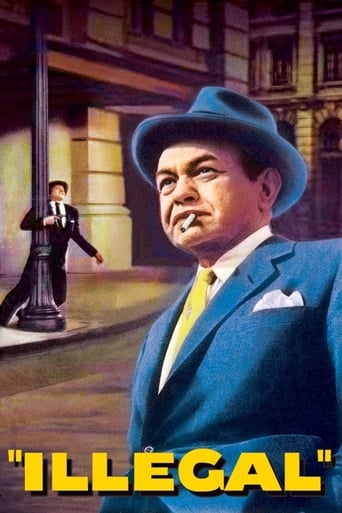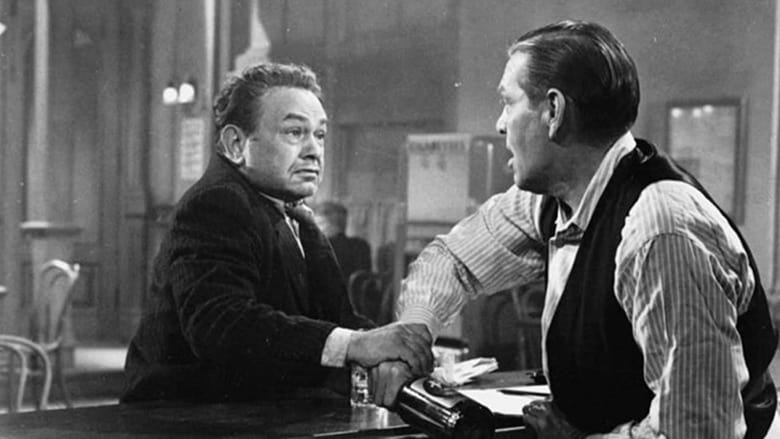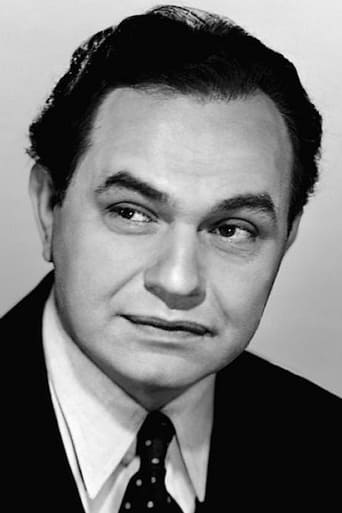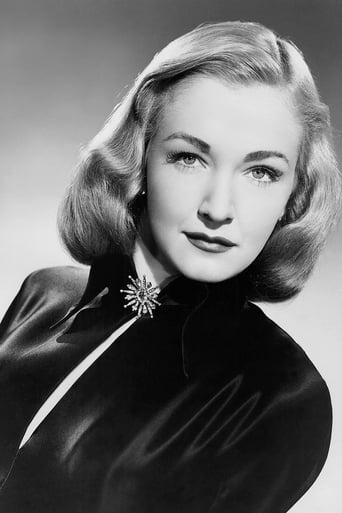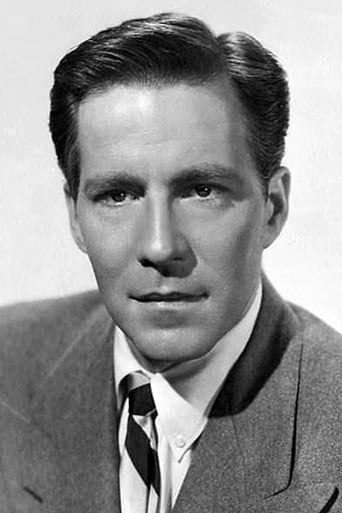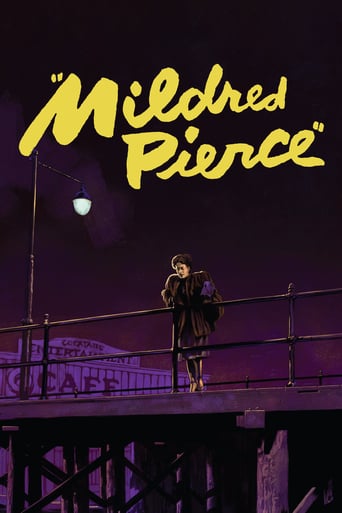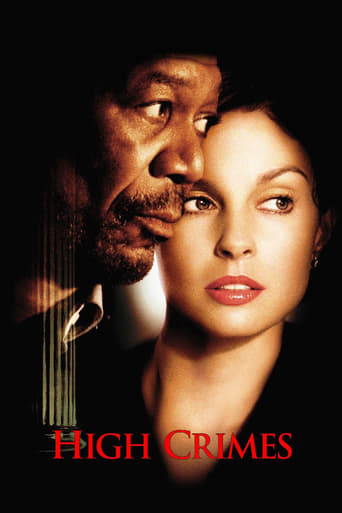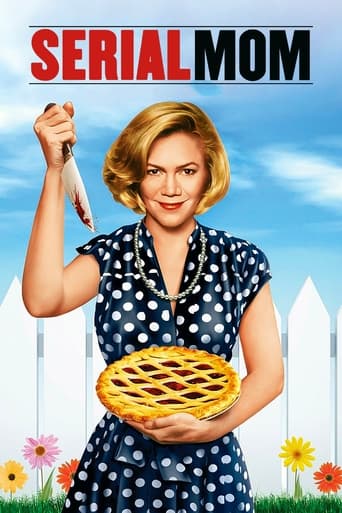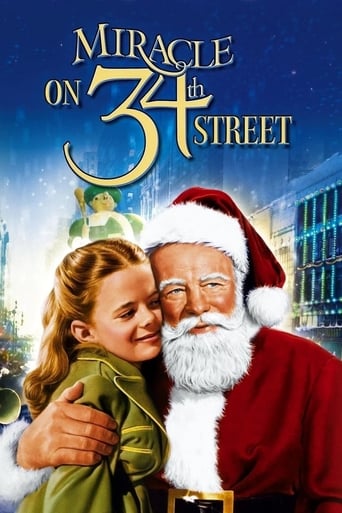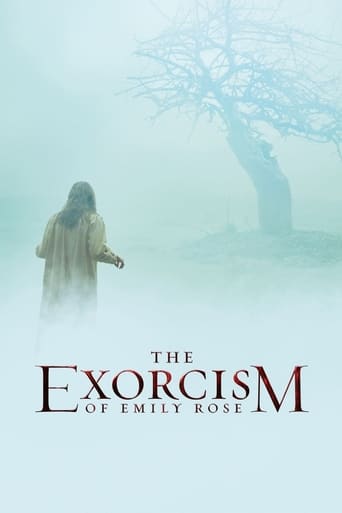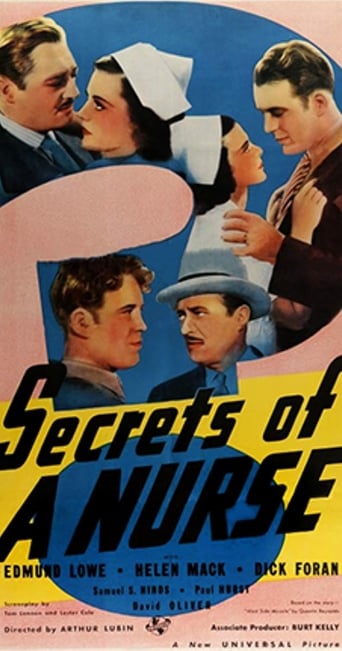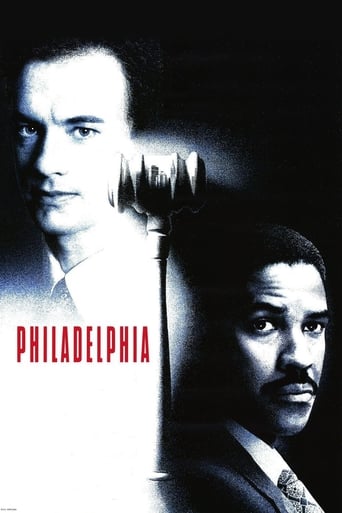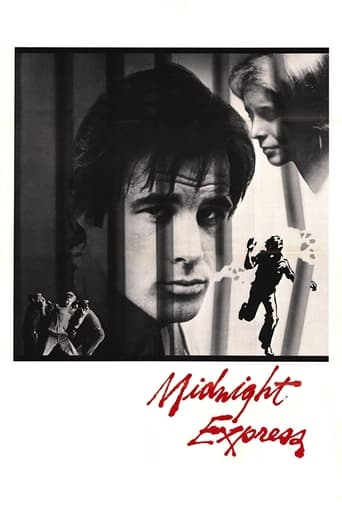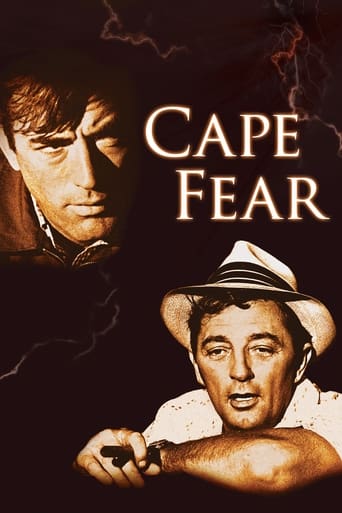Illegal (1955)
A hugely successful DA goes into private practice after sending a man to the chair -- only to find out later he was innocent. Now the drunken attorney only seems to represent criminals and low lifes.
Watch Trailer
Cast


Similar titles
Reviews
It's fun, it's light, [but] it has a hard time when its tries to get heavy.
If the ambition is to provide two hours of instantly forgettable, popcorn-munching escapism, it succeeds.
This film is so real. It treats its characters with so much care and sensitivity.
While it is a pity that the story wasn't told with more visual finesse, this is trivial compared to our real-world problems. It takes a good movie to put that into perspective.
Has anyone else noticed that some of the best underrated or little known movie gems of the Forties and Fifties have only one word titles? I'm thinking of films like Bogart's "Conflict (1945), "Detour (1945) and "Impact" (1949). All of these turned out to be nifty noir thrillers, and although "Illegal" may not totally fit the noir definition, it still packs a decent punch with it's compelling story line.This one also has Edgar G. Robinson as a less than scrupulous prosecuting attorney who switches sides after a man who's convicted of murder turns out to be innocent, but winds up in the electric chair right before Victor Scott (Robinson) can make the save. You know, there was something odd about that courtroom scene when Edward Clary (DeForest Kelley) was found guilty. The jury delivered their guilty charge immediately after Scott's closing argument, so why wouldn't they have deliberated on a verdict? Somebody goofed big time on that one.Now I'm not familiar enough with courtroom proceedings to know if Scott's antics could ever fly in a court of law, but they certainly livened up this story. How about Scott decking Henry Kulky coming off the witness stand to prove a point? Or downing the vial of poison with a narrow forty five minute window to get his stomach pumped? I think Robinson's character probably stretched the legal definition of being out of order to the max with those stunts, but the judge and the opposing attorneys in those cases didn't seem that fazed by it, so who am I to say? In hindsight, this film has an eclectic cast of supporting actors on hand, with folks like Nina Foch, Hugh Marlowe, Ellen Corby and Ed Platt appearing in the story, and if you keep your eye on Jayne Mansfield (and who wouldn't?), you'll notice that she lent new meaning to the definition of hourglass figure when she appeared as a witness in the final courtroom scene. Not bad for one of her very first screen appearances.
"Illegal" is an intelligent and nimble little crackerjack of a crime thriller starring Edward G. Robinson as a D.A who's maybe a little too smart - and smart-assed - for his own good. He's ruthless because his job requires him to be. He wins cases. That's what he's paid for. He's quick of wit and tongue. He's ambitious, canny and - technically, at least - in compliance with the law. He's, at heart, a good man, and he's in the public eye, but he's not universally well-liked. One day, he sends the wrong man to the chair. And he comes undone.This sets in motion a plot that winds and twists without becoming outlandish. The picture, which doesn't strike me as a "noir", moves at a nice clip, each of the broad spectrum of characters is painted with a defining brush stroke, and the dialogue is efficient and snappy. It's the kind of movie that hooks you and hooks you good. It did me."Illegal" is, above all, an Edward G. Robinson picture. It doesn't seem like a star vehicle. Robinson shares the screen with everyone, yet he is such a forceful presence and creates such a complex and complicated character, sympathetic yet warped, you search him out in every scene. You want to watch him. He's magnetic. I'm becoming a real Edward G. Robinson fan on the strength of his 40's and 50's films alone, some of them comic reminders of his earlier gangster persona. He's as good in this movie as he is in "Scarlet Street", which I saw recently for the first time and which, well... kinda sorta blew my mind. I've lived a little and can recognize the truths that some of these lively, well-written B-movies shine a light on.
***SPOILERS*** On trial for the murder of his 20 year old fiancée Goria Benson, Kathy Marlowe, Edward Clary, DeForest Kelly, was a dead man even before the jury verdict came in in having hot shot, who never lost a case, D.A Victor Scott,Edward G. Robinson, prosecute the case against him. Found guilty of 1st degree murder Clary is sentenced to death in the state's electric chair still proclaiming his innocence. As things turned out on the eve of Clary's execution this hood, Chevez, was gunned down by the police in a robbery attempt and on his death bed confessed with evidence that only her murderer could have known that he in fact murdered young Gloria Benson.Not being able to prevent Clary's execution Scott completely falls apart and ends up a drunkard as well as being put bars for assault in belting a man in a bar, where he was drinking himself into a drunken stupor, who brought up the unpleasant subject of Clary's execution. Now with a new insight in the law and how unjust it is Scott decides to become a defense attorney and help the other side of the law, those on trial, in order to make up for what he did in sending an innocent man to the electric chair. As it turned out it was a decision he would soon live to regret. At first trying to do the right thing in defending those whom he felt were Innocent Scott gravitated to become mob boss Frank Garland, Albert Dekker, top mouthpiece because the money was good and he got to go places in his practice. In Scott defending other hoods like Garland who were working for him. Another major mistake that Scott made that would almost cost him his life was in trying to get his assistance, whom he paid to go through law school, Ellen Miles, Nina Foch, to marry his as well as Ellen's good friend top justice department lawyer Ray Borden, Hugh Marlowe. Like his judgment in the clients he took on Scott was totally wrong in what a person Borden was. Besides being a degenerate gambler, in playing the horses, Borden was also deeply in debt to Frak Garland in him paying Garland's bookies off. Ray Borden was to soon become the mole in the D.A's office who tipped Garland off every time the local police and D.A Ralph Ford, Edward Patt, were going to make a pinch or raid on him and his associates!One of Edward G.Robinson's better films since he was almost blackballed out of Hollywood by the HUAC as being a communist sympathizer which in fact he wasn't. Eddie was never better as the hard punching,with a roll of nickels in his fists, and take no BS defense attorney Victor Scott. A man who came to his senses in how corrupt he was becoming in trying to erase a terrible mistake he made,by sending an innocent man to the chair, by defending mobsters like Frank Garland to whom murder was nothing more then a business expense! ***SPOILERS*** It's when Ellen is arrested in the murder of her husband Ray that Scott came to his senses in that working for the mob or Frank Garland will end up burying him like what it's about to do to Ellen. It was Ellen who found out that Ray, not Victor Scott whom she suspected, was the one tipping Garland off that lead to Ray trying to fling her out of her and his apartments 12 floor window! In was fortunate for Ellen that she had a .38 revolver handy and blew Ray away before he could do it! It was Ray's big mistake in calling his boss,Frank Garland, at his office from his and Ellen's home phone just before he,in attempting to murder her, was blown away by his wife Ellen. In was also fortunate on both Ellen and her friend and now defense lawyer Scott that Garland fired his busty private secretary Angie O'Hara played by a drop dead gorgeous 22 year old Jayne Mansfield, in her film debut and what a debut she made, in that it freed her to testify against him in court in that Ray was the person who called him the evening he in fact was killed! That not only exposed Ray as the mole in the D.A's office but exonerated Ellen by proving that she shot and killed her husband in self defense! P.S As for Victor Scott after getting a bullet in his gut by Garland henchman Andy Garth, Jan Merlin, he decided to quit the law business and go into the arts, mostly art collecting, which was a far more rewarding and less dangerous occupation for him.
This is as good an example of what you might call "character suspense" of any film I can think of from the 50s. Edward G. Robinson keeps the audience wondering about his motives and ethics right down to the end; any time the scenario threatens to get stale, he throws a curve at us just like his character, district attorney turned legal gun-for-hire Victor Scott. Compelled by his obsession with the woman who he helped to raise, Ellen Miles (Nina Foch) and an ego that will not allow him to lose a single case, he seems to careen into one situation after another out of his control only to somehow emerge victorious and heroic.The story is kicked off by a series of events surrounding an innocent man accused of a murder, played by DeForest Kelly. After having convicted and executed an innocent man, Scott loses faith in his ability to prosecute and hits the bottle hard. He finds his edge again in criminal defense after spending a few nights in the tank himself. Some aspects of the story at this point are just a fairly obvious progression towards a redemption moment, but Robinson keeps everything moving forward by inserting his own brand of ambiguity into the character, made up of the small but obvious moments that lend charm to so many of his performances.The film is not really notable in terms of direction. In fact if anything it's notable as an example of good acting triumphing over mediocre direction; there are a lot of scenes like the one when Robinson comes out of the courtroom after drinking the poison and stops to drink at a fountain, that seem to me poorly staged compared to the effect he could have achieved.A movie made very classy by two memorable stars, Robinson as well as Foch. Foch seems unsure of her character at some points, perhaps due to the direction or the often strange script, but she makes something out of her scenes with Robinson and Hugh Marlowe (playing her devious husband). Marlowe seems uncomfortable in the role, if an actor as stiff as Marlowe can ever be said to be un-nerved then he was in some scenes in this film.

